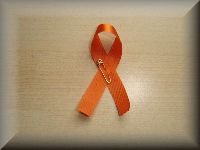
Today is National Self Injury Awareness Day - Wear an orange ribbon or orange bracelet to let someone know you care and are aware! It has been astounding to me that both Teenboy (14, in middle school in a 'good' neighborhood) and Kitten (11, and in elementary school) know about this. Teenboy says he knows kids that do this ... even a cousin.
Weekend America did a great segment on it in February, so please share this information. Share your strength, if you have one, share your story -- we can raise awareness, and hopefully help our girls!
Self-injury is a deliberate, repetitive, non-lethal harming of one’s body. It is a way to cope with, relieve, or express painful feelings. People may also self-injure to punish themselves, feel alive, or get attention from others. Relief is short-lived and prevents the self-injurer from feeling or dealing with deeper emotional pains. Of the estimated 3 million Americans who exhibit self harm behavior, up to 360,000 of which are teenagers will exhibit self-injuring behaviors – 70% of whom are female.
Types of self-injury include: cutting, scratching, picking scabs or interfering with wound healing, burning, punching self or objects, infecting oneself, inserting objects in body openings, bruising or breaking bones, serious forms of hair pulling, other various forms of bodily harm.
Other self-injury facts: There are about two to three million self-injurers of all ages in the United States. Most self-injurers begin to hurt themselves during puberty. Many self-injurers also struggle with eating disorders and alcohol or substance abuse. Some warning signs of self-injury include: unexplained injuries, scars on the arms or legs, a pattern of curious scabs or abrasions, sharp objects (razor blades, pieces of glass, bent paper clips, etc.) stored in unusual places, wearing winter clothing during warm months, low self-esteem, being withdrawn or very secretive, being distracted or preoccupied, refusing to explain injuries or scars, inability to function at work or school, serious depression, serious anxiety.
Sources of Help: S.A.F.E. AlternativesTM 1-800-DON’T-CUT
www.selfinjury.com National Youth Crisis Hotline 1-800-448-4663 National Mental Health Association 1-800-969-6942
www.nmha.orgResources for more information: article from a self-injurer’s point of view:
http://www.girlzone.com/insideout/WeepingWillow_io.htmlWebsite defining and providing assistance with SI:
http://www.palace.net/~llama/psych/injury.html

